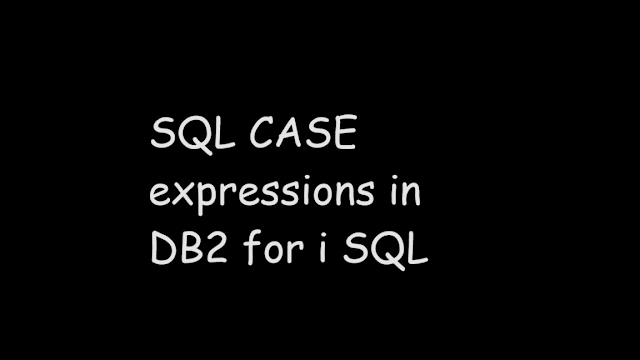 |
| SQL CASE expressions in DB2 for i SQL |
CASE statement
The SQL CASE statement is a conditional statement. The CASE statement works like a simple IF-THEN-ELSE statement. It test multiple condition and return a value when the first condition is satisfied.
CASE syntax
CASE
WHEN condition1 THEN result1
WHEN condition2 THEN result2
WHEN conditionN THEN resultN
ELSE result
END
If we see the syntax of SQL CASE statement above we observed that it starts with keyword CASE and followed by multiple conditional statement. Each conditional statement consists of at least one pair of WHEN and THEN statements where WHEN specifies the conditional statement to be tested and THEN specifies the action to be taken if the respective WHEN condition gets satisfied.
Example #1: Create another column based on existing column using CASE statement.
Refer STUDENT table data here.
Data in STUDENT table:
ROLLNO NAME SUBJECTID
1 Ankur 201
2 Rahul 202
3 Raman 203
4 Vimal 204
5 Samar 290
Using CASE statement
SELECT ROLLNO, NAME, SubjectId,
CASE
WHEN SubjectId = 201 THEN 'Computer'
WHEN SubjectId = 202 THEN 'Science'
ELSE 'Subject Name not assigned'
END AS SubjectName
FROM Student
This can also be written as:
SELECT student.*,
CASE
WHEN SubjectId = 201 THEN 'Computer'
WHEN SubjectId = 202 THEN 'Science'
ELSE 'Subject Name not assigned'
END AS SubjectName
FROM Student
Used case statement and created a new column based on existing column and assigned a name after END Case statement using AS clause.
ROLLNO NAME SUBJECTID SUBJECTNAME
1 Ankur 201 Computer
2 Rahul 202 Science
3 Raman 203 Subject Name not assigned
4 Vimal 204 Subject Name not assigned
5 Samar 290 Subject Name not assigned
Example #2: CASE statement with ORDER BY clause.
Refer STUDENT table data here.
Data in STUDENT table:
ROLLNO NAME SUBJECTID
1 Ankur 201
2 Rahul 202
3 Raman 203
4 Vimal 204
5 Samar 290
Using CASE statement with order by to sort the result in descending order based on NAME or ROLLNO depending upon the value of the NAME column. If the Name starts with 'R' then the result is sorted by the name column otherwise the result is sorted by the SubjectName column.
SELECT student.*,
CASE
WHEN SubjectId = 201 THEN 'Computer'
WHEN SubjectId = 202 THEN 'Science'
ELSE 'Subject Name not assigned'
END AS SubjectName
FROM student
ORDER BY
(
CASE
WHEN NAME LIKE 'R%' THEN NAME
ELSE SubjectName
END
) desc
ROLLNO NAME SUBJECTID SUBJECTNAME
4 Vimal 204 Subject Name not assigned
5 Samar 290 Subject Name not assigned
3 Raman 203 Subject Name not assigned
2 Rahul 202 Science
1 Ankur 201 Computer
If sorted in ascending order then the result would look like:
SELECT student.*,
CASE
WHEN SubjectId = 201 THEN 'Computer'
WHEN SubjectId = 202 THEN 'Science'
ELSE 'Subject Name not assigned'
END AS SubjectName
FROM student
ORDER BY
(
CASE
WHEN NAME LIKE 'R%' THEN NAME
ELSE SubjectName
END
)
ROLLNO NAME SUBJECTID SUBJECTNAME
1 Ankur 201 Computer
2 Rahul 202 Science
3 Raman 203 Subject Name not assigned
4 Vimal 204 Subject Name not assigned
5 Samar 290 Subject Name not assigned
Example #3: Simple WHEN clause in CASE statement
let's right the Example#1 query using Simple WHEN clause in CASE statement.
Refer STUDENT table data here.
SELECT student.*,
CASE SubjectId
WHEN 201 THEN 'Computer'
WHEN 202 THEN 'Science'
ELSE 'Subject Name not assigned'
END AS SubjectName
FROM Student
Output:
ROLLNO NAME SUBJECTID SUBJECTNAME
1 Ankur 201 Computer
2 Rahul 202 Science
3 Raman 203 Subject Name not assigned
4 Vimal 204 Subject Name not assigned
5 Samar 290 Subject Name not assigned
Example #4: Search WHEN clause in CASE statement
Example #1 is the perfect example for this.